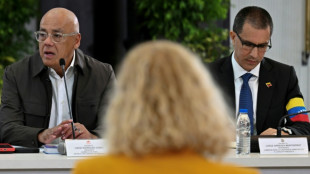
-
 Argentina govt launches account to debunk 'lies' about Milei
Argentina govt launches account to debunk 'lies' about Milei
-
Australia drug kingpin walks free after police informant scandal

-
 Dupont wants more after France sparkle and then wobble against Ireland
Dupont wants more after France sparkle and then wobble against Ireland
-
Cuba says willing to talk to US, 'without pressure'

-
 NFL names 49ers to face Rams in Aussie regular-season debut
NFL names 49ers to face Rams in Aussie regular-season debut
-
Bielle-Biarrey sparkles as rampant France beat Ireland in Six Nations

-
 Flame arrives in Milan for Winter Olympics ceremony
Flame arrives in Milan for Winter Olympics ceremony
-
Olympic big air champion Su survives scare

-
 89 kidnapped Nigerian Christians released
89 kidnapped Nigerian Christians released
-
Cuba willing to talk to US, 'without pressure'

-
 Famine spreading in Sudan's Darfur, UN-backed experts warn
Famine spreading in Sudan's Darfur, UN-backed experts warn
-
2026 Winter Olympics flame arrives in Milan

-
 Congo-Brazzaville's veteran president declares re-election run
Congo-Brazzaville's veteran president declares re-election run
-
Olympic snowboard star Chloe Kim proud to represent 'diverse' USA

-
 Iran filmmaker Panahi fears Iranians' interests will be 'sacrificed' in US talks
Iran filmmaker Panahi fears Iranians' interests will be 'sacrificed' in US talks
-
Leicester at risk of relegation after six-point deduction

-
 Deadly storm sparks floods in Spain, raises calls to postpone Portugal vote
Deadly storm sparks floods in Spain, raises calls to postpone Portugal vote
-
Trump urges new nuclear treaty after Russia agreement ends

-
 'Burned in their houses': Nigerians recount horror of massacre
'Burned in their houses': Nigerians recount horror of massacre
-
Carney scraps Canada EV sales mandate, affirms auto sector's future is electric

-
 Emotional reunions, dashed hopes as Ukraine soldiers released
Emotional reunions, dashed hopes as Ukraine soldiers released
-
Bad Bunny promises to bring Puerto Rican culture to Super Bowl

-
 Venezuela amnesty bill excludes gross rights abuses under Chavez, Maduro
Venezuela amnesty bill excludes gross rights abuses under Chavez, Maduro
-
Lower pollution during Covid boosted methane: study

-
 Doping chiefs vow to look into Olympic ski jumping 'penis injection' claims
Doping chiefs vow to look into Olympic ski jumping 'penis injection' claims
-
England's Feyi-Waboso in injury scare ahead of Six Nations opener

-
 EU defends Spain after Telegram founder criticism
EU defends Spain after Telegram founder criticism
-
Novo Nordisk vows legal action to protect Wegovy pill

-
 Swiss rivalry is fun -- until Games start, says Odermatt
Swiss rivalry is fun -- until Games start, says Odermatt
-
Canadian snowboarder McMorris eyes slopestyle after crash at Olympics

-
 Deadly storm sparks floods in Spain, disrupts Portugal vote
Deadly storm sparks floods in Spain, disrupts Portugal vote
-
Ukrainian flag bearer proud to show his country is still standing

-
 Carney scraps Canada EV sales mandate
Carney scraps Canada EV sales mandate
-
Morocco says evacuated 140,000 people due to severe weather

-
 Spurs boss Frank says Romero outburst 'dealt with internally'
Spurs boss Frank says Romero outburst 'dealt with internally'
-
Giannis suitors make deals as NBA trade deadline nears

-
 Carrick stresses significance of Munich air disaster to Man Utd history
Carrick stresses significance of Munich air disaster to Man Utd history
-
Record January window for transfers despite drop in spending

-
 'Burned inside their houses': Nigerians recount horror of massacre
'Burned inside their houses': Nigerians recount horror of massacre
-
Iran, US prepare for Oman talks after deadly protest crackdown

-
 Winter Olympics opening ceremony nears as virus disrupts ice hockey
Winter Olympics opening ceremony nears as virus disrupts ice hockey
-
Mining giant Rio Tinto abandons Glencore merger bid

-
 Davos forum opens probe into CEO Brende's Epstein links
Davos forum opens probe into CEO Brende's Epstein links
-
ECB warns of stronger euro impact, holds rates

-
 Famine spreading in Sudan's Darfur, warn UN-backed experts
Famine spreading in Sudan's Darfur, warn UN-backed experts
-
Lights back on in eastern Cuba after widespread blackout

-
 Russia, US agree to resume military contacts at Ukraine talks
Russia, US agree to resume military contacts at Ukraine talks
-
Greece aims to cut queues at ancient sites with new portal

-
 No time frame to get Palmer in 'perfect' shape - Rosenior
No time frame to get Palmer in 'perfect' shape - Rosenior
-
Stocks fall as tech valuation fears stoke volatility


How social media can 'trigger' eating disorders in young people
Social media can push vulnerable young people towards developing eating disorders by glorifying thinness and promoting fake, dangerous advice about diet and nutrition, experts warn.
Young women and girls are much more likely to suffer from illnesses such as anorexia, bulimia and binge eating disorder, though rates among men have been increasing.
Research has shown the percentage of people worldwide who have had some kind of eating disorder during their lives rose from 3.5 percent in 2000 to 7.8 percent in 2018, a timeframe that captures the rise of social media.
For the professionals trying to help teenagers recover from these disorders, misinformation from influencers on platforms such as TikTok and Instagram is a huge problem.
"We no longer treat an eating disorder without also addressing social media use," French dietitian and nutritionist Carole Copti told AFP.
"It has become a trigger, definitely an accelerator and an obstacle to recovery," she added.
The causes of eating disorders are complex, with psychological, genetic, environmental and social factors all having the potential to make someone more susceptible.
Social media "is not the cause but the straw that may break the camel's back," said Nathalie Godart, a psychiatrist for children and adolescents at the Student Health Foundation of France.
By promoting thinness, strictly controlled diets and relentless exercise, social media weakens already vulnerable people and "amplifies the threat" to their health, she told AFP.
- 'Vicious cycle' -
Just one recent example is the #skinnytok trend, a hashtag on TikTok full of dangerous and guilt-inducing advice encouraging people to drastically reduce how much food they eat.
For Charlyne Buigues, a French nurse specialising in eating disorders, social media serves as a gateway to these problems, which are "normalised" online.
She condemned videos showing young girls with anorexia exposing their malnourished bodies -- or others with bulimia demonstrating their "purges".
"Taking laxatives or vomiting are presented as a perfectly legitimate way to lose weight, when actually they increase the risk of cardiac arrest," Buigues said.
Eating disorders can damage the heart, cause infertility and other health problems, and have been linked to suicidal behaviour.
Anorexia has the highest rate of death of any psychiatric disease, research has found. Eating disorders are also the second leading cause of premature death among 15- to 24-year-olds in France, according to the country's health insurance agency.
Social media creates a "vicious cycle," Copti said.
"People suffering from eating disorders often have low self-esteem. But by exposing their thinness from having anorexia on social media, they gain followers, views, likes... and this will perpetuate their problems and prolong their denial," she added.
This can especially be the case when the content earns money.
Buigues spoke of a young woman who regularly records herself throwing up live on TikTok and who had "explained that she was paid by the platform and uses that money to buy groceries".
- 'Completely indoctrinated' -
Social media also makes recovering from eating disorders "more difficult, more complicated and take longer", Copti said.
This is partly because young people tend to believe the misleading or fake diet advice that proliferates online.
Copti said consultations with her patients can feel like she is facing a trial.
"I have to constantly justify myself and fight to make them understand that no, it is not possible to have a healthy diet eating only 1,000 calories -- that is half what they need -- or that no, it is not normal to skip meals," she said.
"The patients are completely indoctrinated -- and my 45-minute weekly consultation is no match for spending hours every day on TikTok," she added.
Godart warned about the rise of people posing as "pseudo-coaches", sharing incorrect, "absurd" and potentially illegal nutrition advice.
"These influencers carry far more weight than institutions. We're constantly struggling to get simple messages across about nutrition," she said, pointing out that there are lifelines available for those in need.
Buigues takes it upon herself to regularly report problematic content on Instagram, but said it "serves no purpose".
"The content remains online and the accounts are rarely suspended -- it's very tiring," she said.
The nurse has even advised her patients to delete their social media accounts, particularly TikTok.
"It may seem radical but until young people are better informed, the app is too dangerous," she said.
H.Nasr--SF-PST

